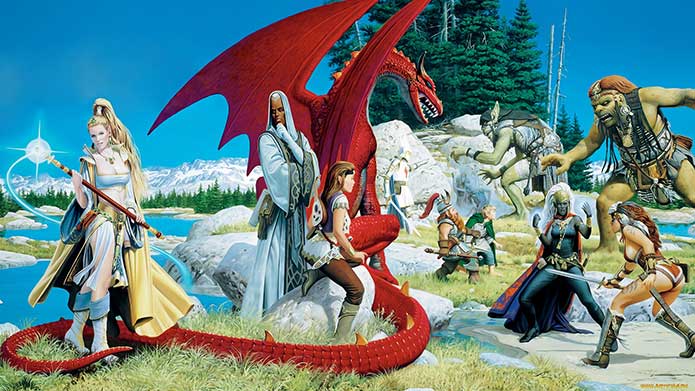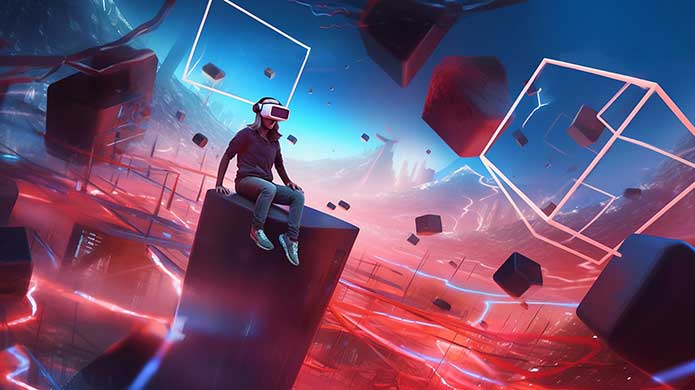The realm of online entertainment has undergone a metamorphosis as dramatic as any digital butterfly. From the days of flickering green text on black screens to the immersive landscapes of virtual reality, the way we interact with digital worlds has been revolutionized. This journey, however, began not with pixels and polygons, but with the power of imagination fueled by words.
Adventures in Imagination
The earliest online entertainment worlds were born in the 1970s, nestled within the nascent world of computer networks. These were text-based adventures, often referred to as MUDs (Multi-User Dungeons). Pioneering titles like “Adventure” and “Zork” transported players to fantastical realms using nothing more than text descriptions.
Players navigated these worlds by typing in commands and encountering puzzles, monsters and treasures along the way. While seemingly primitive by today’s standards, these games fostered a powerful sense of immersion, relying solely on the player’s imagination to flesh out the environments and characters.
The Rise of the Graphical Gateway
 The 1990s ushered in a graphical revolution. With the increasing power of personal computers, online entertainment blossomed into a vibrant visual landscape. Graphical MUDs, or Graphical User Interface MUDs (GUIMDs), emerged, offering players a visual representation of the text-based worlds they had previously explored.
The 1990s ushered in a graphical revolution. With the increasing power of personal computers, online entertainment blossomed into a vibrant visual landscape. Graphical MUDs, or Graphical User Interface MUDs (GUIMDs), emerged, offering players a visual representation of the text-based worlds they had previously explored.
This era also saw the rise of Massively Multiplayer Online (MMO) games like “Ultima Online” and “EverQuest.” These titles offered persistent online worlds where thousands of players could interact simultaneously, forging communities, embarking on quests and battling one another.
The concept of online casino gaming also found its footing in this era, with platforms like Betway offering a digital space for players to try their luck at virtual slots and tables. To experience the thrill of online casino games, players could complete a simple Betway register to get in on the action. The ease of access and convenience offered by online platforms revolutionized the way people gambled, fostering a new social aspect of the activity.
The Age of Avatars
The new millennium brought a surge in online entertainment’s complexity and diversity. MMORPGs (Massively Multiplayer Online Role-Playing Games) like “World of Warcraft” dominated the landscape, offering vast, intricate worlds filled with character customization options, deep storylines and challenging end-game content.
The rise of esports and competitive online gaming leagues further solidified the cultural impact of online entertainment. Titles like “StarCraft” and “Counter-Strike” fostered dedicated fanbases, professional players and high-stakes tournaments. This era witnessed the blurring of lines between entertainment and professional sport, with esports athletes achieving celebrity status and commanding significant prize pools.
Embracing Virtual Reality
 The current generation of online entertainment pushes the boundaries of immersion further than ever before. Virtual Reality (VR) technology allows players to step not just into online worlds, but to truly inhabit them. Games like “Half-Life: Alyx” utilize VR to create unparalleled experiences, placing players directly in the heart of the action.
The current generation of online entertainment pushes the boundaries of immersion further than ever before. Virtual Reality (VR) technology allows players to step not just into online worlds, but to truly inhabit them. Games like “Half-Life: Alyx” utilize VR to create unparalleled experiences, placing players directly in the heart of the action.
VR not only enhances visual fidelity but also introduces a new level of interactivity, allowing players to manipulate objects and interact with the virtual environment more naturally. The future of online entertainment seems poised to continue down this path, blurring the lines between reality and the digital realm.
The Evolving Landscape
As technology continues to evolve, so too will online entertainment. The upcoming generation of consoles, like the PlayStation 5 and Xbox Series X, boast processing power and graphical fidelity that would have been unimaginable just a decade ago. Titles like “Final Fantasy 16,” “Armored Core 6,” “Baldur’s Gate 3,” “God of War: Ragnarok” and “Elden Ring” promise to push the boundaries of storytelling and gameplay within these hyper-realistic environments.
The remake of “Final Fantasy 7,” titled “Final Fantasy 7 Rebirth,” demonstrates the potential for revisiting beloved classics with a modern graphical overhaul, while “Final Fantasy 7 Remake” showcased the ability to breathe new life into established narratives. Games like “Cyberpunk 2077” explore the potential of sprawling, open-world environments, offering players an unprecedented level of freedom and exploration. The online entertainment landscape is constantly evolving, embracing new technologies and trends to offer ever-more immersive and engaging experiences.
Exploring the Social Side of Online Gaming Worlds
 The world of online entertainment offers far more than just pixels and polygons. It’s a vibrant social landscape where friendships blossom, communities thrive and lasting connections are forged. Beyond the thrill of competition or the joy of exploration lies a powerful human element: the ability to connect with others who share your passion for gaming.
The world of online entertainment offers far more than just pixels and polygons. It’s a vibrant social landscape where friendships blossom, communities thrive and lasting connections are forged. Beyond the thrill of competition or the joy of exploration lies a powerful human element: the ability to connect with others who share your passion for gaming.
Keep reading to delve into the heart of online entertainment’s social fabric, and glean insights on how to cultivate friendships and build communities within these virtual realms.
The Power of Shared Experiences
The foundation of online social interaction lies in the shared experiences offered by online games. Whether you’re battling alongside teammates in a heated esports match, venturing into a vast open world with fellow adventurers, or simply trading tips and strategies in a bustling online forum, these shared experiences foster a sense of camaraderie and belonging.
Joining the Guild: Finding Your Tribe
Many online games offer guilds or clans, virtual communities dedicated to specific interests within the game. These groups provide a natural starting point for building social connections. Guilds often organize regular events, raids and challenges, encouraging collaboration and teamwork. By joining a guild, you’ll connect with players who share your preferred playstyle, interests within the game world, or even a similar sense of humor.
Voice Chat and Online Forums

Voice chat is a powerful tool for fostering social interaction in online games. Coordinating strategies with your team in real-time, sharing a laugh after a successful raid, or simply chatting with fellow players while exploring the game world can significantly enhance the social experience. Most online games offer built-in voice chat functionalities, but many communities also utilize external platforms like Discord for deeper engagement.
Online forums dedicated to specific games offer another avenue for social connection. Here, players can discuss strategies, share tips and tricks, and provide mutual support. These forums often foster a strong sense of community, allowing players to connect even when they’re not actively playing the game.
Beyond the Game: Virtual Events and Social Gatherings
Many online gaming communities extend their reach beyond the game itself. Virtual events like online tournaments, cosplay contests and even streamed charity marathons provide opportunities for players to connect on a deeper level, often leading to friendships that transcend the digital realm. Some communities may even organize real-life meetups, allowing players to put faces to the usernames and forge even stronger bonds.
Building Lasting Relationships
Like any social environment, online communities flourish on the principles of respect and positivity. Being a good teammate, offering constructive criticism and fostering a positive atmosphere are key to building lasting relationships within online gaming communities.
The social side of online entertainment offers a unique and enriching experience. By embracing the opportunities for connection within these virtual worlds, you can transform your online gaming journey from a solitary pastime to a fulfilling social experience. So, put on your virtual armor, join a guild and get ready to forge friendships that will transcend the digital realm.


 by Symphonie
by Symphonie